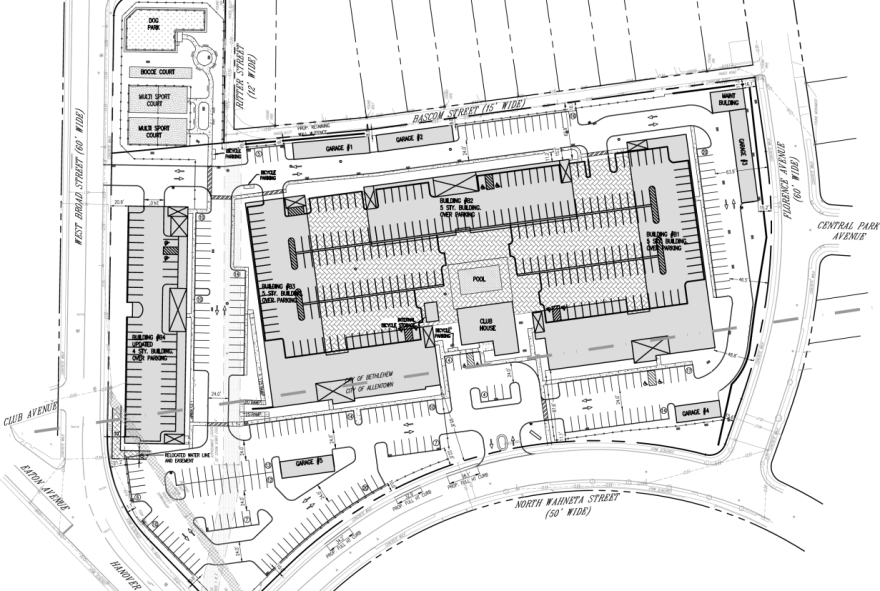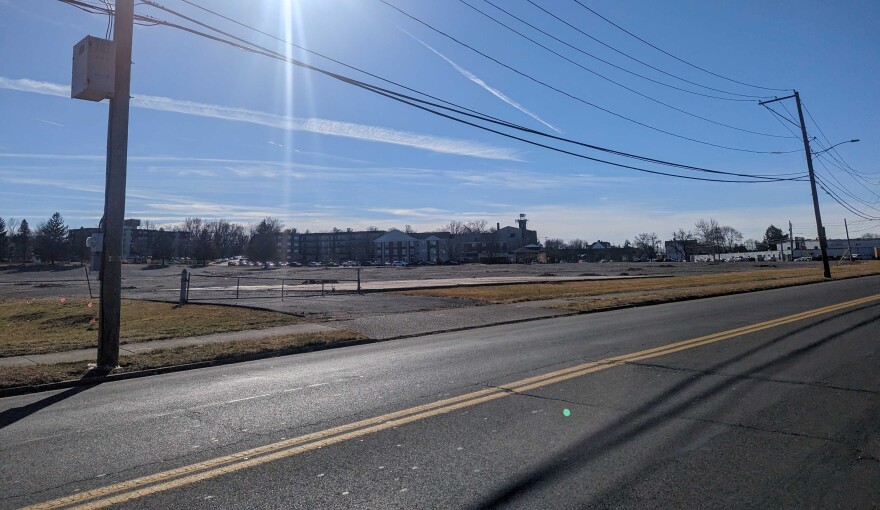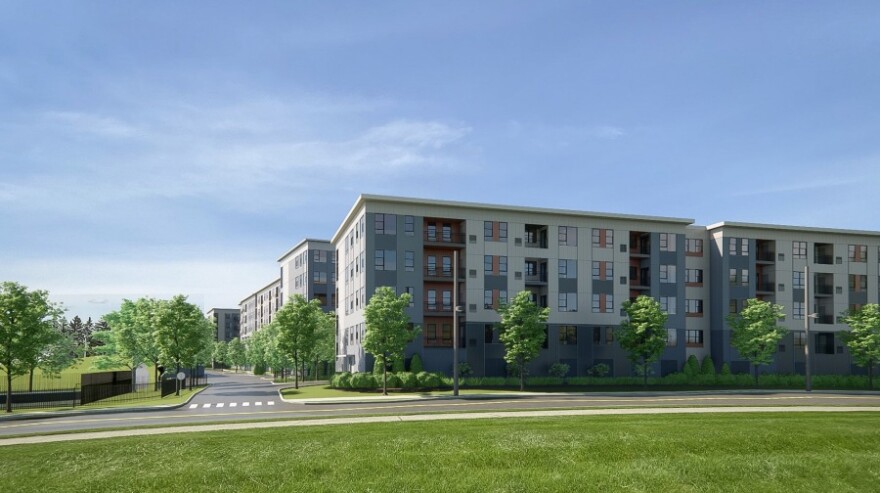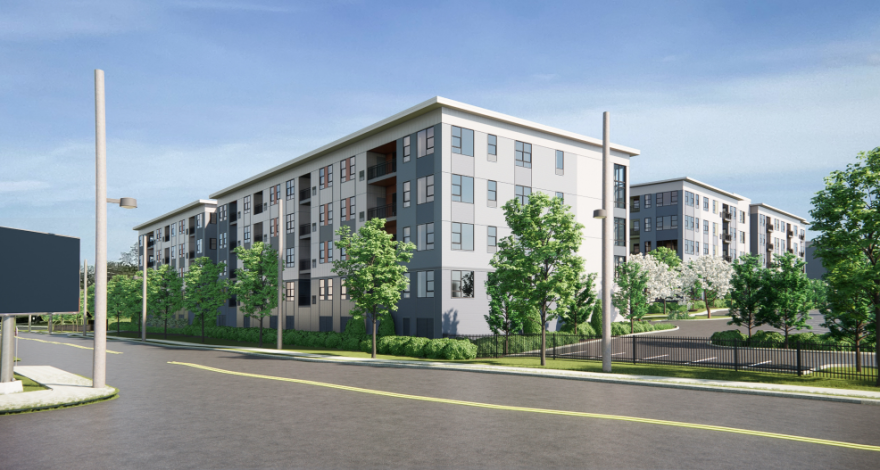BETHLEHEM, Pa. — The attorney for the proposed Hanover Apartments development on Thursday called a length limit on apartments "arbitrary" and asked the city Planning Commission to change it.
But the board voted 4-1, with Thomas Barker dissenting, to recommend rejecting the call for a curative zoning code text amendment to do away with a 180-foot maximum building length.
The ordinance currently prohibits residential apartments to have buildings longer than 180 feet in a Limited Commercial district.
The amendment challenges the zoning ordinance of the City of Bethlehem "on the grounds the ordinance arbitrarily and unreasonably restricts [the] petitioner's property rights."
Bethlehem City Council will have the final say.
Planning Commission Chairman Robert Melosky said he believed it was the first curative text amendment request he's seen in his more than a decade on the board.

The project
The property at 2300 Hanover Ave. would straddle the border of Bethlehem and Allentown, with mostly parking on the Allentown side and apartment units in Bethlehem, officials said.
Project plans call for 317 apartments and 550 parking spaces in a four-building development. The complex is proposed to stand five stories.
The largest building is proposed to be 286 feet. Developer and equitable owner BAHX LLC, of Cedar Knolls, New Jersey, still calls for leeway of more than 100 feet to that provision.
Last year, the developer also requested relief on a first-floor commercial use within the frontage of the Broad Street building.
The Zoning Hearing Board denied varying on building length but provided a favorable interpretation of the ordinance regarding the commercial use.
Plans are to consolidate four tax parcels — 2235 W. Broad St., 2300 Hanover Ave., 2220 W. Florence St. and 2211 W. Broad St. — into one for the proposed four buildings.
Some of that land once was home to a Bennett Toyota car dealership.
Residents have described the area around Hanover Avenue and nearby West Broad Street and Club Avenue to be a “high-crash” location in need of more warning signs, rumble strips and a roundabout.
The 180-foot rule
Developer attorney James Preston said there have been other multifamily dwellings approved by the city in excess of 180 feet that also were zoned for Limited Commercial.
He cited a project at Fourth Street and Steel Avenue.
“That provision doesn’t serve any legitimate purpose,” Preston said of the 180-foot rule.
“There’s no reason to have to do that, to impose on a developer the need to conform with an arbitrary 180-foot building length only on apartment buildings, regardless of where the property is or its current condition.”
“That provision doesn’t serve any legitimate purpose. There’s no reason to have to do that, to impose on a developer the need to conform with an arbitrary 180-foot building length only on apartment buildings, regardless of where the property is or its current condition.”Hanover Apartments developer attorney James Preston
City Planning and Zoning Director Darlene Heller later said the Fourth and Steel project has only seen the sketch plan phase, but that developer did get density relief from the Zoning Hearing Board.
“Because one project and not another receives a variance by the Zoning Hearing Board is not, in and of itself, evidence that the zoning ordinance is unlawful,” city assistant solicitor Matthew Deschler said.
Deschler also provides legal guidance for the planning commission.
“You had stated that you don’t believe that this speaks to density, like regulation and density,” planner Matthew Malozi said, speaking to Preston.
“But regulating the size of the building, whether it’s 180 [feet] or some other regulation, does speak to exactly that: density.”

All in the math — and more
“This connection between density and building length is false,” Preston rebutted.
“Under the city of Bethlehem zoning ordinance, the density is a function of the algebra in the zoning ordinance; it’s not a function of buildings. And you meet those density calculations regardless of building.”
Heller said that while it’s true that her team uses a formula for calculating density by lot area, there are a number of other factors also involved, including setbacks and parking.
“There’s plenty of reasons why you might be able to do a math calculation on density and not be permitted to build all of those units,” Heller said.
“This connection between density and building length is false."Hanover Apartments developer attorney James Preston
Deschler said he and Heller aren’t “disinterested, impartial observers” of the matter in question.
Deschler added he’s “duty bound” to defend the city’s current zoning ordinance and its legal standing, and that making the proposed curative amendment would not only affect this property but others with that zoning type.
He said it’s important to focus on whether the current zoning promotes the health, welfare and safety of the residents there and around the city.
“There’s plenty of reasons why you might be able to do a math calculation on density and not be permitted to build all of those units."Bethlehem Planning and Zoning Director Darlene Heller
Also, officials had to decide whether the zoning was appropriate for massing, building length and intensity of use in that district, Deschler said.
But he said the applicant, under the proposed amendment, states there’s a lack of due process as a result of the current zoning.
Heller wrote in her memo to the commission that the developer’s property, sized at 8.74 acres, is among the largest of the Limited Commercial tracts in the city.
“Adopting the proposed curative text amendment would allow for the construction of multifamily dwellings in excess of 180 feet not just on the Petitioner’s property, but on all CL lots in the City, many of which are smaller in size and unsuitable for such large-scale development,” Heller wrote.
'Sneaky business'
“I truly feel you have to consider the quality of life of the existing neighborhood before you go ahead and grant a massive building in there,” said resident Terry Kloiber, who lives near the lot.
“This change of zoning is going to be detrimental to our quality of life — not to mention that I feel kind of sneaky business [going on]. The zoning board said no. When does 'no' mean 'no'?”
"The zoning board said no. When does 'no mean 'no?'”West Bethlehem resident Terry Kloiber
Resident Paul Fondl said the nearby traffic is dangerous enough, and all of the new cars coming into play with the apartments could lead to a fatal situation one day.

Action in court
Another opposing resident, Mary Jo Makoul, said the city zoning hearing board issued its report on the previously discussed variances on Sept. 29, and that came with 30 days to file an appeal.
She and her neighbors filed an appeal.
Preston then filed an appeal regarding the zoning hearing board's building length decision in the days following the residents' filing.
Makoul said the judge quashed Preston’s appeal “because it was late.”
“We were not late in any of our filings,” Preston responded. “There was a motion to quash this file, and we did not respond to that.”
“It was late,” Kloiber said in the middle of Preston’s statement.
“That’s an accurate summation of what went on at the common pleas level,” Deschler said of Preston’s point.
The matter is under discussion in court and awaiting further scheduling, according to Kloiber.


